Background
She was born in Quincy, Massachussets, the daughter of Charles Allen and Elizabeth Curtis Follett.



(Originally published in 1896. This volume from the Cornel...)
Originally published in 1896. This volume from the Cornell University Library's print collections was scanned on an APT BookScan and converted to JPG 2000 format by Kirtas Technologies. All titles scanned cover to cover and pages may include marks notations and other marginalia present in the original volume.
https://www.amazon.com/Speaker-House-Representatives-1896/dp/1112316027?SubscriptionId=AKIAJRRWTH346WSPOAFQ&tag=prabook-20&linkCode=sp1&camp=2025&creative=165953&creativeASIN=1112316027
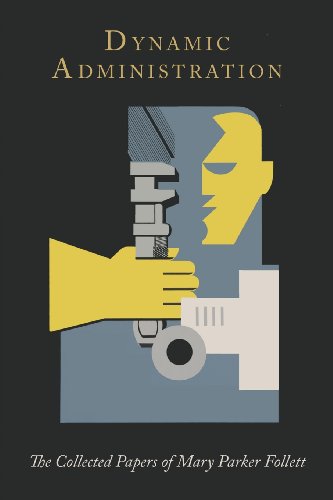
(2013 Reprint of 1940 Edition. Full facsimile of the origi...)
2013 Reprint of 1940 Edition. Full facsimile of the original edition, not reproduced with Optical Recognition Software. Mary Parker Follett (1868-1933) was an American social worker, management consultant and pioneer in the fields of organizational theory and organizational behavior. She also authored a number of books and numerous essays, articles and speeches on democracy, human relations, political philosophy, psychology, organizational behavior and conflict resolution. Along with Lillian Gilbreth, Mary Parker Follett was one of two great women management gurus in the early days of classical management theory. She admonished over-managing employees, a process now known as micromanaging, as "bossism" and she is regarded by some writers as the "mother" of Scientific Management.
https://www.amazon.com/Dynamic-Administration-Collected-Papers-Follett/dp/1614274770?SubscriptionId=AKIAJRRWTH346WSPOAFQ&tag=prabook-20&linkCode=sp1&camp=2025&creative=165953&creativeASIN=1614274770
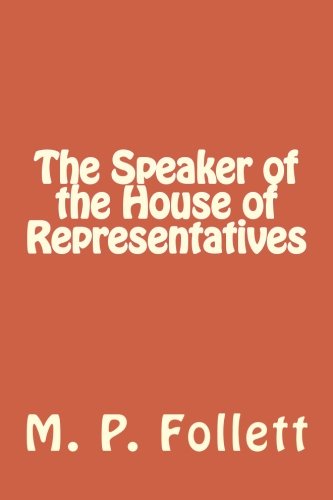
(This early work by management consultant Mary Parker Foll...)
This early work by management consultant Mary Parker Follett describes the power wielded by the Speaker of the House of Representatives.
https://www.amazon.com/Speaker-House-Representatives-M-Fottett/dp/1469992841?SubscriptionId=AKIAJRRWTH346WSPOAFQ&tag=prabook-20&linkCode=sp1&camp=2025&creative=165953&creativeASIN=1469992841

(Please do not hesitate to contact us for any inquiry. Mon...)
Please do not hesitate to contact us for any inquiry. Money back guarantee for every item in our inventory. Your order will be delivered in 2-10 business days. We will provide tracking information. If you order a used book, it may or may not have companion materials. Thank you for your interest.
https://www.amazon.com/1868-1933-organization-solution-government-Longmans/dp/B004IQ3AEA?SubscriptionId=AKIAJRRWTH346WSPOAFQ&tag=prabook-20&linkCode=sp1&camp=2025&creative=165953&creativeASIN=B004IQ3AEA
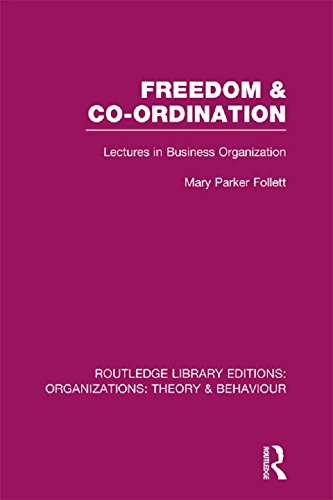
( A pioneer in the fields of organizational theory and be...)
A pioneer in the fields of organizational theory and behaviour Mary Parker Follett authored a number of books and numerous essays, articles and speeches on human relations, political philosophy, psychology and management. The first woman invited to address the London School of Economics, this book includes five lectures delivered to the newly-formed Department of Business Administration at the LSE in 1933, as well as six given by Parker Follett a the Taylor Society in New York in 1926.
https://www.amazon.com/Freedom-Co-ordination-RLE-Organizations-Organization-ebook/dp/B00EPE1AHO?SubscriptionId=AKIAJRRWTH346WSPOAFQ&tag=prabook-20&linkCode=sp1&camp=2025&creative=165953&creativeASIN=B00EPE1AHO
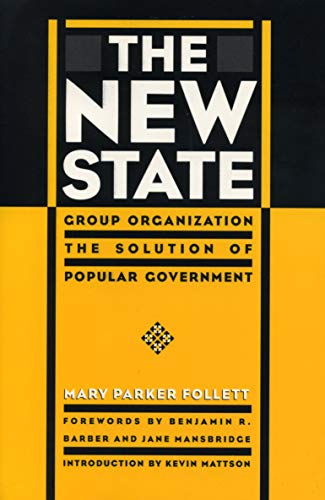
( Having organized neighborhood discussion groups before ...)
Having organized neighborhood discussion groups before World War I, Follett traces the dynamics she noticed in these forums and develops some core concepts useful for those working on questions of public deliberation today. She also shows how deliberation informs debates that raged in political theory during her own era. She discusses the works of pluralists (Harold Laski), idealists (T. H. Green and Bernard Bosanquet), and pragmatists (William James) and makes important arguments about the relationship between socialism and democracy. Her work is marked by rigorous thinking about the implications of democratic principles as they relate to political and socioeconomic organization. This book articulates the formation of a “new state” growing out of the local activities of citizens and renews the American idea of "federalism" in order to balance local activities and national purposes. By doing this, Follett leaves us with a pathbreaking work that demands more attention today. With preliminary essays by Benjamin Barber and Jane Mansbridge, plus a historical introduction provided by Kevin Mattson, this reissued edition will be of use to scholars and activists who are currently working on issues of democratic participation, civic education, and public deliberation.
https://www.amazon.com/New-State-Organization-Solution-Government/dp/0271018267?SubscriptionId=AKIAJRRWTH346WSPOAFQ&tag=prabook-20&linkCode=sp1&camp=2025&creative=165953&creativeASIN=0271018267
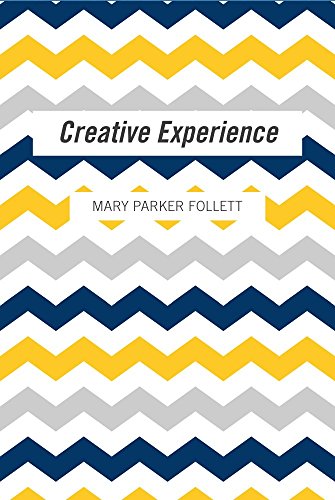
(The social sciences are not gathering all the fruits of c...)
The social sciences are not gathering all the fruits of certain recent developments of thought; they are not all of them even using the most modern method of study, which is wholly to abandon the region of abstract speculation and to study the behavior of men. Many political scientists talk about conferring power without analyzing power; many economists talk about representation in industry without analyzing representation; there are sociologists who talk about individual and social interests without sufficiently analyzing the difference, if there is one, between individual and social interests. In a book by a recent writer on politics these four words are used in a sentence of three lines: power, purpose, freedom, service. But the author has not told us what these words mean—and we do not know. We can find out only by watching in thousands of cases the working of power, purpose, freedom, only by watching the behavior of men. The greatest need of today is a keen, analytical, objective study of human relations. We preach “compromise” as the apex of the ethical life, we laud the “balance of power” as our political and international faith, we give our substance and ourselves to establish an “equilibrium” of nations. But compromise sacrifices the integrity of the individual, and balance of power merely rearranges what already exists; it produces no new values. No fairer life for men will ever be the fruit of such doctrine. By adherence to such a creed we bind ourselves to equivalents, we do not seek the plusvalents of experience. If experience is to be progressive, another principle of human association must be found. I know of but one way to seek it. The conceptions of politics, economics and sociology should be studied -while they are still living in the lives of men. We need to study not the “conception” of a general will but concrete joint activity. We should, without disregarding whatever light the past has thrown on these questions, now look at men in their daily occupations at factory or store, at town meeting or congress, and see what we can learn. We should abandon the region of mere statement and counterstatement where so much controversy takes place. We should take our language too from the concrete daily happenings; the words we now use have nearly always ethical connotations which prejudge, which merely in themselves attribute praise or blame to individuals or groups or state.
https://www.amazon.com/Creative-Experience-Mary-Parker-Follett-ebook/dp/B01IPHN9Z2?SubscriptionId=AKIAJRRWTH346WSPOAFQ&tag=prabook-20&linkCode=sp1&camp=2025&creative=165953&creativeASIN=B01IPHN9Z2
She was born in Quincy, Massachussets, the daughter of Charles Allen and Elizabeth Curtis Follett.
She prepared for college at Thayer Academy, Braintree, Massachussets, where she came under the influences that stimulated her interests in philosophy and scientific methods. In 1888 she entered the institution that became Radcliffe College in Cambridge, Massachussets, where she devoted herself largely to the study of economics, government, and philosophy.
She spent the year 1890-91 at Newnham College, Cambridge, England. Here she laid the foundations of her lifelong interest in English life and it was during this year that she read a paper before the Newnham Historical Society, "The Speaker of the House of Representatives, " that became the germ of her book on the same subject that appeared in 1896. Returning to America she was graduated from Radcliffe in 1898, taking her degree summa cum laude.
On her return from further study abroad she became connected with the Roxbury Neighbour-hood House, where she took an active interest in vocational guidance and developed her idea of school centers, an idea which she put into operation by obtaining the evening use of the public school buildings for discussion groups, the study of special topics, and for recreation.
Her theory, put into practice with infinite care and perseverance, was to get different kinds of people of different walks and occupations to understand each other's point of view, and through what has been described as a sort of "psychological interpenetration, " to create, each in the other, his own inner experience. This theory was worked out in her best-known book, Creative Experience (1924).
Miss Follett became a member of the board of vocational guidance of the Boston school board early in its existence and served on its first committee on placement. This work afforded her a valuable contact with industry and her interest now shifted from political and social to industrial relations. Out of this broader interest grew The New State (1918), which brought her wide recognition from scholars, both in America and abroad. In connection with her work in Roxbury, she became a member of the Minimum Wage Board of the Woman's Municipal League, where she represented the people and worked in close association with both employers and employed.
In these contacts the most important phase of her career began, namely, a study of the philosophy of business management. She was never in business herself, but she understood the psychological foundations of business administration and read papers and delivered lectures before groups of business men which were constructive in their suggestions. In her teachings in this field competent judges considered her half a generation ahead of her contemporaries.
From 1924 to near the close of her life she lived in England, studied industrial conditions, and wrote and lectured extensively. During these years she became actively interested in the League of Nations and made many visits to Geneva.
In addition to works already mentioned and to many shorter articles, she made contributions to three works edited by Henry C. Metcalf: Scientific Foundations of Business Administration (1926); Business Management as a Profession (1927); and The Psychological Foundations of Management (1927). In 1941 there appeared in England, under the editorship of H. C. Metcalf and L. Urwick, Dynamic Administration; the Collected Papers of Mary Parker Follett.
She died in Boston, following an operation, at the age of sixty-five.
She published many works. She was one of the first women ever invited to address the London School of Economics, where she spoke on cutting-edge management issues. She also distinguished herself in the field of management by being sought out by President Theodore Roosevelt as his personal consultant on managing not-for-profit, non-governmental, and voluntary organizations.
(The social sciences are not gathering all the fruits of c...)
( Having organized neighborhood discussion groups before ...)
( A pioneer in the fields of organizational theory and be...)
(This early work by management consultant Mary Parker Foll...)
(Please do not hesitate to contact us for any inquiry. Mon...)
(Originally published in 1896. This volume from the Cornel...)
(2013 Reprint of 1940 Edition. Full facsimile of the origi...)
book
She was also deeply religious.
Her theory, put into practice with infinite care and perseverance, was to get different kinds of people of different walks and occupations to understand each other's point of view, and through what has been described as a sort of "psychological interpenetration, " to create, each in the other, his own inner experience.
She was a member of the Taylor Society and served as vice-president of the National Community Center Association.
Her nature was affectionate and her personal friendships included men and women of various walks in life both in America and abroad.
The American edition followed a year later. Miss Follett was a person of many cultural interests, among which were music and art and the great humanizing studies.
Quotes from others about the person
Ann Pawelec Deschenes (1998) found obscure reference pointing to Mary Parker Follett having coined the term "transformational leadership". She quotes from Edith A. Rusch's The Social Construction of Leadership: From Theory to Praxis (1991):
. .. writings and lectures by Mary Parker Follett from as early as 1927 contained references to transformational leadership, the interrelationship of leadership and followership, and the power of collective goals of leaders and followers (p. 8).
Management theorist Warren Bennis said of Follett's work, "Just about everything written today about leadership and organizations comes from Mary Parker Follett's writings and lectures. "
She was never married.
